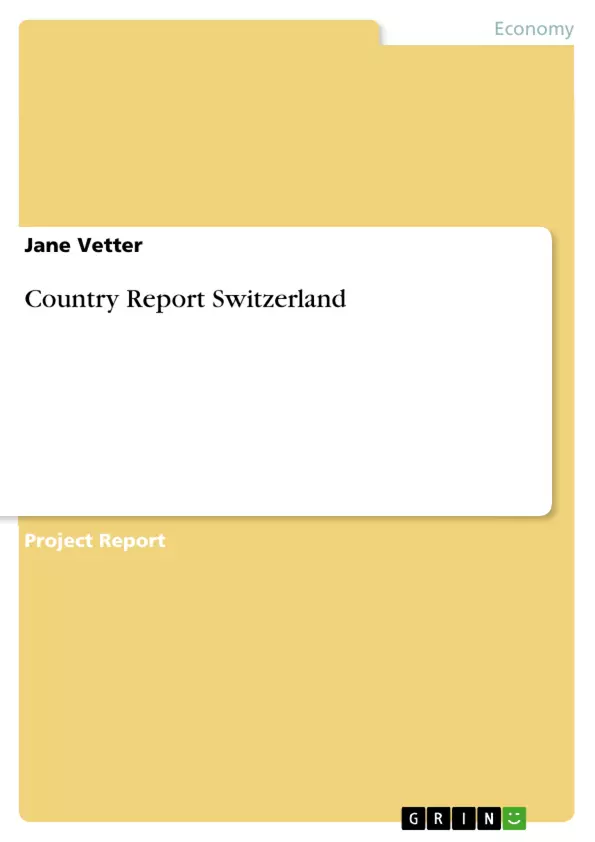Switzerland’s economy is very stable and well-known for its monetary security and banking system. Due to its rather small size and high labor specialization, industry and trade are economic key factors. Throughout the 20th century, Switzerland maintained its position as wealthiest country of Europe. The 1990s, however, changed Switzerland’s economic position due to various reasons. The following section will examine economic coefficients which are important for international trade, such as exports, imports, and foreign investment. Besides, the paper will take a closer look at Gross Domestic Product (GDP) development and other facts which allow us to analyze Switzerland’s economic well-being. The historic data is based on Rais’ and Stauffer’s overview of Switzerland’s trade cycle history from 1990 until 2002. Recent trends are compiled of sources coming from Wikipedia’s Online Encyclopedia, the World Bank, and the OECD.
Inhaltsverzeichnis (Table of Contents)
- Introduction
- Economic Overview
- Trade
- Gross Domestic Product (GDP)
- Economic Development
- 1990-1991
- 1992
- 1993
- 1994-1996
- 1997-1999
- 2000-2002
- 2003-2004
- Trade Partners
- Trade Barriers
- Current Economic Situation
- Conclusion
Zielsetzung und Themenschwerpunkte (Objectives and Key Themes)
This paper analyzes Switzerland's economic development and its current economic situation. It aims to provide a detailed overview of key economic indicators, such as trade, GDP, and foreign investment, while exploring the factors that have influenced Switzerland's economic performance throughout the late 20th century and early 21st century.- The impact of global economic trends on Switzerland's economy
- The role of trade and foreign investment in Switzerland's economic growth
- The challenges facing Switzerland's economic sustainability
- The potential for future economic development in Switzerland
Zusammenfassung der Kapitel (Chapter Summaries)
The paper begins with an introduction to Switzerland's economy, highlighting its stability and dependence on industry and trade. It then delves into the economic development of the country, analyzing its performance in the context of global economic changes. This analysis covers key economic indicators such as GDP, trade balance, and foreign investment, focusing on the period from 1990 to 2004. The paper then focuses on Switzerland's trade partners, its trade barriers, and its current economic situation. It highlights the challenges Switzerland faces due to its small size and its dependence on external factors, while emphasizing its economic potential for future growth.Schlüsselwörter (Keywords)
Switzerland's economic development, trade, Gross Domestic Product (GDP), foreign investment, global economic trends, trade barriers, economic sustainability, future economic growth, European Economic Area Agreement, World Trade Organization (WTO), Organisation for Economic Co-operation and Development (OECD).Frequently Asked Questions
How stable is Switzerland's economy?
Switzerland's economy is considered very stable, highly specialized, and world-renowned for its banking system and monetary security.
What are the key economic factors for Switzerland?
Due to its small size, Switzerland relies heavily on high labor specialization, international trade (exports/imports), and foreign investment.
How did Switzerland's economic position change in the 1990s?
The 1990s brought challenges that affected its status as Europe's wealthiest country, leading to shifts in GDP development and trade cycles.
What role does the Gross Domestic Product (GDP) play in analyzing Switzerland?
GDP development is a primary indicator used to analyze the country's economic well-being and its resilience against global economic trends.
Who are Switzerland's main trade partners?
The report examines Switzerland's relationships with major partners, often influenced by agreements with the EU and the World Trade Organization (WTO).
What challenges does Switzerland face regarding economic sustainability?
Challenges include its dependence on external markets, trade barriers, and maintaining its high standard of living in a volatile global economy.
- Arbeit zitieren
- Jane Vetter (Autor:in), 2006, Country Report Switzerland, München, GRIN Verlag, https://www.grin.com/document/116457



